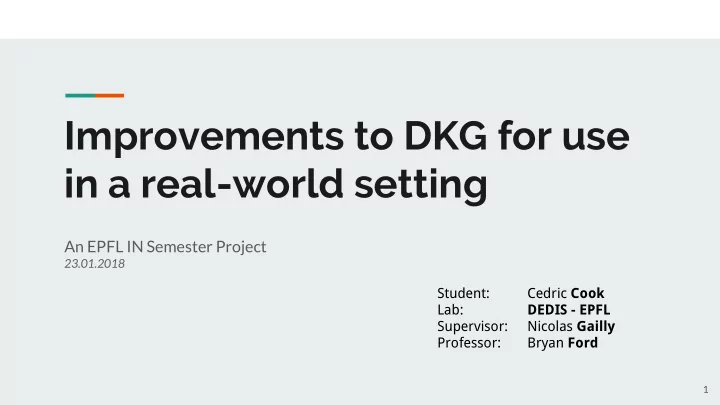

Improvements to DKG for use in a real-world setting An EPFL IN Semester Project 23.01.2018 Student: Cedric Cook Lab: DEDIS - EPFL Supervisor: Nicolas Gailly Professor: Bryan Ford 1
Outline Motivation Problem Statement Setting Solution Discussion 2
Motivation 3
Swiss Federal Council And their law passing method The Swiss Federal Council 7 councillors (& 1 chancellor) 4
The council wants to pass a law Some key is needed to pass the law ● Decentralized, no trusted 3d party ● 7 councillors participate ● At least 5 need to agree to pass ● Distributed Key Generation , of course! 5
But this is 2018... Distributed Key Generation was invented in the 90's ● The council wants to do this over the internet ● DEDIS to the rescue ● Connection problems, congestion, etc... ● 6
Problem The limitations of the current implementation of DKG are such statement that it is not performant in the real-world setting, due to a strict timing assumption. This project overcomes these limitations by reducing the timing assumption, and use round termination procedures to provide certain guarantees. 7
Setting: Kyber, VSS & DKG 8
Kyber Advanced crypto library for Go ● Provides cryptographic primitives ● For applications that need more ● than signing and encryption Used by Cothority ● The kyber repository on GitHub. 9
VSS (in Kyber) Part 1 of a VSS secret share Part 2 of a VSS secret share 10
VSS (cont'd) Part 3 of a VSS secret share 11
DKG (in Kyber) Can be understood as: n parallel instances of VSS. In each instance one participant is the VSS dealer, others are verifiers 2 Implementations in Kyber: 1. Pedersen (Joint Feldman VSS) 2. Rabin (Use of 2 polynomials) 12
The synchronicity issue 13 Diagram showing possible complications in one round of VSS
Solution 14
Solution Enable protocol to continue with absent participants ● Use round termination signal ● Adapt VSS, DKG, and their tests in function of this. ● 15
Solution implementation "SetTimeout" methods added to both VSS and DKG ● Trigger for termination procedure ● Mark unresponsive participants ○ Check all responses ○ Decide on validity of key ○ Guarantee the correctness with tests ● New edge cases were found ○ 16
Discussion 17
Discussion Changes allow use in more general Future work: ● setting Long term keys are no good ● Protocol continue to function correctly ● Share renewal ● Performance is not greatly different ● 18
Conclusion Project target: Improve Kyber DKG for real-world use ● Problem focus found on timing assumption ● Changes to allow round termination implemented ● Protocol remains correct ● Target accomplished ✓ ● Questions? 19
References 20
Recommend
More recommend